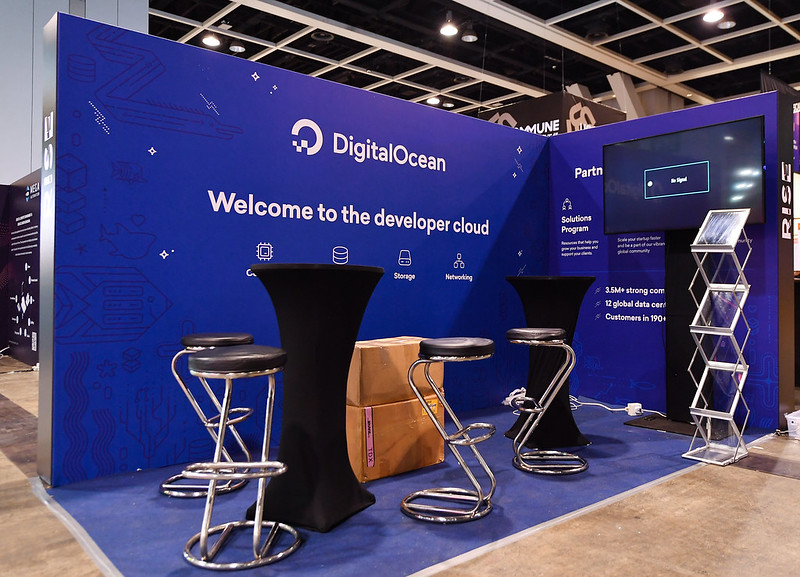DigitalOcean Expands Container And Kubernetes Capabilities

Recently listed DigitalOcean (NYSE: DOCN) announced its first-quarter results since it went public. The company continues to invest in expanding its containerized and Kubernetes offerings to grow market share.
Digital Ocean’s Financials
For the first quarter of the year, revenues grew 29% to $93.7 million. Annual Run-Rate Revenue (ARR) grew 30% to $388 million. Adjusted EBITDA came in at $30.7 million, compared to adjusted EBITDA of $18.4 million a year ago.
Among other key metrics, total customers grew 7% to over 585,000. Net Dollar Retention (NDR) rate grew to 107%, reporting an increase of 600 basis points from a year ago, and Average Revenue Per Customer (ARPU) in the quarter grew 20% to $53.68.
For the current quarter, DigitalOcean forecast revenues of $97-$99 million. For the fiscal year, it forecast revenues of $405-$409 million. The market forecast revenues of $98.29 million for the quarter, and $407.74 million for the fiscal year.
DigitalOcean’s Product Expansion
Recently, DigitalOcean announced its new feature, Deploy to DigitalOcean App Platfom, that allows developers to deploy their code to production quickly. The offering increases DigitalOcean’s managed services strategy, simplifying cloud computing and giving developers and businesses the ability to spend more time to focus on creating software. The new lightweight platform-as-a-service (PaaS) environment is made available on top of Kubernetes and automates the deployment of open source code on the DigitalOcean cloud service from a GitHub repository.
Other capabilities added to App Platform include the ability to transfer existing root domains to DigitalOcean, support for wildcard domains, the ability to configure a static document to optimize performance of Single Page Applications (SPAs), and a Cross-Origin Resource Sharing (CORS) mechanism that uses additional HTTP headers to tell a browser to let a web application running at one domain have permission to access selected resources from a server at a different domain. These new features will allow development teams to run a process either before or after the deployment of an application.
It also announced the general availability of DigitalOcean Container Registry, a private registry through which developers can share artifacts. It provides total security of a private Docker image registry, and the ability to easily integrate to the Docker environment and DigitalOcean Kubernetes clusters, giving secure, stable, and performant rollouts of images to clusters. It provides a workflow for connecting the registry to clusters within accounts.
The market for DigitalOcean’s services is highly competitive and rapidly evolving. It faces large, diversified technology companies that focus on large enterprise customers such as Amazon (AWS), Microsoft (Azure), Google (GCP), IBM, Salesforce’s Heroku, and Oracle. For these players, DigitalOcean’s services are a minor share of their revenues. But it also competes with smaller, niche cloud service providers that target individuals and smaller businesses and narrower geographic markets. Some players in this segment include Vultr, Platform.sh, and Linode. Competition from the larger organizations remains stiff due to their wider enterprise reach, and deeper pockets.
DigitalOcean’s strategy is to focus on small businesses and startups. It caters to more than 570,000 customers in over 185 countries. It has built a developer learning community with over 34,000 developer tutorials, technical guides, and community-generated Q&As. The company has over 5 million developers on its platform, which includes over 30,000 ISVs.
Its stock is currently trading at $40.07 with a market capitalization of $4.1 billion. It was trading at a 52-week high of $46.35 in April this year. DigitalOcean had raised $775.5 million from its IPO where it sold its stock at $47 apiece.
Prior to listing in March this year, it had raised $455.6 million in 13 rounds of funding, with the most recent round being held in May last year. Its investors include Andreessen Horowitz, Access Industries, EquityZen, Kliwla Family Office AG, Viaduct Ventures, Mighty Capital, Opus Bank, Barclays Investment Bank, East West Bank, and HSBC Bank.
Disclosure: All investors should make their own assessments based on their own research, informed interpretations and risk appetite. This article expresses my own opinions based on my own ...
more


